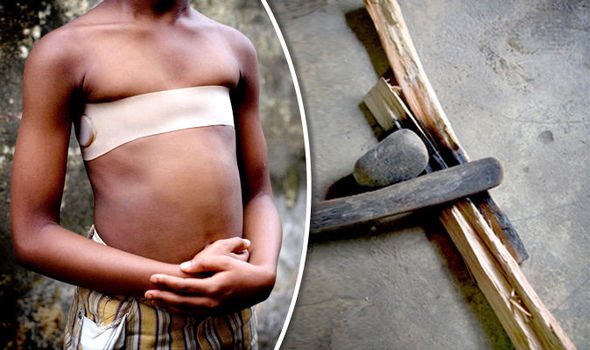Since 2014, police and the UK Border Force have periodically targeted various ports in the UK, in an attempt to prevent and detect cases of Female Genital Mutilation (FGM). These predominantly police led operations are known nationally as Operation Limelight. They are described by the Home Office as a “proactive airside operation looking at inbound and outbound flights to ‘countries of prevalence’ for FGM”. Originally a Metropolitan Police Service led initiative at Heathrow Airport, it has now been expanded to other parts of the UK. They have also been adopted at some airports in the US by the FBI and Homeland Security.
Female Genital Mutilation (FGM), involves procedures that include the partial or total removal of the external female genitalia or other injury to the female genital organs. It is often referred to as 'female circumcision', ‘female genital cutting’, circumcision, or simply ‘cutting’ or ‘initiation’. It is carried out for cultural, religious or other non-therapeutic reasons.
It is performed on girls of varying age throughout the world dependent on the belief or practices of the community carrying out the procedure. The age range is typically between 4 and 13 years, with a prime age being between 4 and 8 years. However, it may also be performed on new-borns, just before marriage or during the first pregnancy.
There are four different types of FGM as defined by the World Health Organisation. They include:
- FGM Type 1 - removal of clitoral hood with or without removal of the clitoris.
- FGM Type 2 - removal of the clitoris and partial or total removal of the labia minora (vaginal lips).
- FGM Type 3 - removal of the clitoris, labia minora and majora and the stitching of the vagina leaving a 1 – 2 cm opening. This is strongly linked to virginity and chastity, used to prevent girls from sex outside marriage and suppress sexual feelings. In some cultures, it is considered necessary at marriage for the husband and his family to see her ‘closed’ before being ‘cut’ open enough to be able to have sex.
- FGM Type 4 - pricking, piercing or incising of the clitoris and/or labia; stretching of the clitoris and/or labia; cauterisation by burning of the clitoris and surrounding tissue.
How does it work?
Limelight is a coordinated multi-agency operation, carried out over a short period, normally a week. The focus is placed on passengers travelling between the UK and FGM-prevalent countries. It is generally led by Police and the Border Agency, with the support of health professionals, social worker, NGO’s, port officials and carriers. Best practice is to ensure that survivors of FGM are also involved so they can provide strategic advice and support.
The operation aims to combine preventative work with enforcement. Families, groups and accompanied women and girls are taken to one side and spoken to about their trip. Baggage checks are also conducted, looking for articles associated with FGM. The questioning is handled sensitively, by trained personnel and NGO’s. By engaging with the passengers and raising awareness, the hope is that Limelight will help prevent future acts of FGM taking place. Advice and support are also on hand for any victims who make a disclosure at the time.
The operation normally runs within the summer holiday period, known as “the cutting season”. It is a crude term, but highlights that the school holiday periods are a prime time for girls and young women to be taken from, and returned to the UK for FGM. Whilst the focus is on FGM, officers also have an awareness of other potential safeguarding issues including trafficking, breast ironing and forced marriage. Many of those seeking to carry out FGM are aware that the authorities target this period and have therefore more recently sought to bring a ‘cutter’ into the UK, a person who specifically travels here to perform FGM, potentially on several girls during the period they are here.
The most prevalent countries practising FGM are: Somalia, Sudan, Sierra Leone, Gambia, Liberia, Ethiopia Nigeria, Eritrea, Egypt, parts of Malaysia, Pakistan, Indonesia, the Philippines and the Yemen. The World Health Organisation 2017 updated fact sheet (based on UNICEF data) states that more than 200 million girls and women worldwide have been subject to the procedure in 30 countries in Africa, the Middle East and Asia. 44 million of those girls came from 3 countries - Indonesia, Egypt and Ethiopia. It is a hidden crime and therefore is almost certainly practised here in the UK.
Limelight has been well received in the media and we are only aware of minor criticisms. There has been a suggestion that targeting specific communities is discriminatory and potentially racist. However, the authorities would argue that this is about safeguarding vulnerable people and it would pointless targeting flights and communities where FGM doesn’t exist. It must be intelligence led, based on where FGM is most common. Others would argue that FGM is not as common as the authorities make out. The website, Shifting Sands is run by Brid Hehir, a retired health professional who has worked in Africa. She is concerned that the UK authorities have overstated the problem in the UK and is worried that the response may cause more harm than good. In an article on her site, she is particularly critical of Op Limelight.
Whatever your thoughts are on Limelight, the initiative only runs only a few weeks of the year in a handful of locations. Whilst we personally feel it is a commendable enterprise, its overall impact is limited, both in enforcement and education. Preventing and detecting FGM is a difficult safeguarding problem. Therefore, it is highly important that professionals with safeguarding responsibilities are aware of the potential indicators and follow the ethos of what Limelight hopes to achieve. That’s is, identifying and supporting victims, recognising and safeguarding individuals at risk, and raising awareness in those communities to alter attitudes.
- the girl or her family come from a community that practises FGM.
- members of the family, or the girl herself, indicate that they support or see no issues with FGM. The family may indicate that if a girl hasn’t undergone FGM she may be unsuitable for marriage. Although it shouldn’t be solely relied on, the level of integration within UK society may have an impact, with families that are less immersed in British society more likely to support or encourageFGM. However, do not assume that a family will necessarily want their girl to undergo FGM despite community pressure.
- the girl’s mother, older sibling (s) or other extended family members have already undergone FGM. The risk is higher if the mother has undergone Type 3 FGM as this would indicate that her husband or his family carry a fervent belief that FGM is required to protect the girl’s chastity. However, don’t assume that just because the mother has had a type of FGM that she wants her child to undergo the procedure.
- members of a family are evasive or refuse to discuss FGM when asked.
- a female family elder comes to visit or stay with the family from their country of origin. Remember although FGM is usually initiated by an older female member of the girl’s family or community, men have also been known to carry out FGM.
- the girl reveals or is heard talking about being ‘cut’, an ‘initiation’, or a special ceremony, occasion or procedure, which will make her (or another female relative) a woman.
- her parents request that she is exempted from attending sex and relationship education lessons. This may indicate that the parent does not want her to be educated around her body, sexuality and sexual health which will conflict with their own views of FGM.
- the girl talks about an extended holiday to either her country of origin or another country where the practice is widespread. A high-risk time for girls of school age are the summer holidays. Taking a child out of the UK at the start of a holiday period or out of school early will allow sufficient recovery time before the child must return to school. It may be that no explanation is provided by the family or the explanation sounds unlikely. Of course, there may be a legitimate reason for taking the child abroad for a long period or even remove them from school early, e.g. to visit family, beat the holiday price hike. However, where other risk factors are present, taking a child out of the UK may be an indication that FGM is imminent and therefore heighten the risk.
- the girl has a lengthy absence from school and on her return, there are obvious changes in her behaviour. The child may appear withdrawn, traumatised or depressed. Self-harm might be evident.
- her parents ask for her to be excused from physical education or swimming lessons for no reason or where the reason sounds implausible.
- there is a noticeable increase in the amount of time that the child needs to visit and stay in the toilet or they find it difficult to sit still, fidget and appear to be experiencing pain or discomfort.
- the girl may reveal urinary or menstrual problems but may be reluctant to be completely open through embarrassment or fear of her family.
- there will be a reluctance to be medically examined.
The Female Genital Mutilation Act 2003 and the Prohibition of Female Genital Mutilation (Scotland) Act 2005makes it a criminal offence to:
- perform FGM in the UK
- assist the carrying out of FGM in the UK
- assist a girl to carry out FGM on herself in the UK; and
- assist from the UK a non-UK person to carry out FGM outside the UK on a UK national or permanent UK resident.
It is also an offence for UK nationals or permanent UK residents to:
- perform FGM on any person overseas;
- assist FGM carried out abroad by a UK national or permanent UK resident – this would cover taking a girl abroad to be subjected to FGM
- assist a girl to perform FGM on herself outside the UK; and
- assist FGM carried out abroad by a non-UK person on a girl/woman who is a UK national or permanent UK resident – this would cover taking a girl abroad to be subjected to FGM
There is a general exemption for registered medical practitioners when performing genuine procedures for physical and mental health grounds; or where a female is in labour or has just given birth and any surgery relates to the labour or birth.
Prevention - Where professionals suspect a child is going to be taken out of the country there are several options available to prevent the child being removed. A Prohibitive Steps Order (S8 Children Act 1989) or applying to the court for Wardship can be considered. However, a specific FGM option is now available in the form of FGM Protection Orders. These were introduced when the Female Genital Mutilation Act was amended by Section 73 of the Serious Crime Act 2015.
A FGM Protection Order is a civil measure available through the family court to protect the person at risk of FGM. When granted the terms of the order are case specific, unique to the circumstances of that case. They may include confiscating a passport or travel documents of the girl at risk. Breaching the conditions of the order is a criminal offence carrying a sentence of up to five years’ imprisonment. Alternatively, the Family Court can deal with any breach as ‘contempt of court’. Applications for FGM Protection Orders can be made direct to the court by the person seeking protection, a relevant third party (such as the local authority), or any other person with the permission of the court (normally other agencies or a concerned family member).

Get Involved!
Share Your own Safeguarding News and Research to reach a wider Audience
From Our Blog
Police Protection – A practical guide
Each year across the UK, hundreds of children are removed from harmful situations by the police and placed into ‘Police Protection’. We take a look at this valuable tool, which if used responsibly, can be a very valuable tool in safeguarding vulnerable children.
Sextortion – Guide and Resources
Sextortion – a guide and links to useful resources.
Dementia -The Herbert Protocol
We take a look at The Herbert Protocol, a simple risk reduction tool to be used in the event that an adult with care and support is reported missing. It is widely associated with people living with dementia who go missing, providing police with vital information to enhance the chances of locating a person quickly and safely.
Child Abduction Warning Notices (CAWN’s)
Many missing children are harboured by adults when missing. We take a look at Child Abduction Warning Notices (CAWNS), what they are used for, the processes involved and the law if they are breached.
Related Posts
The Safeguarding Hub
Share Your Safeguarding News And Research To Reach A Wider Audience







